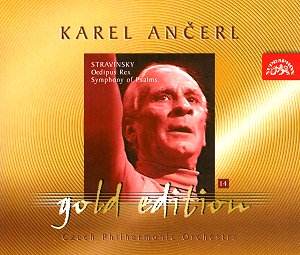It seems to be my misfortune not to have tackled
any of the Ančerl Gold series
before now. This is the 14th disc in the Karel Ančerl Gold
Edition. Incredibly for such forty year old analogue originals
the background noise is, to all intents and purposes, silent.
The intrinsic sound seems to me to be in full possession
of its original earthily vigorous qualities as represented by
those often disdained Supraphon LPs of the late 1960s and early
1970s.
In the two works here Stravinsky's mighty choral
empire is never in doubt. These pieces although having soloists
in the case of Oedipus Rex are
best known for their choral heft. Jaroslav Holecek's essay on
Ančerl is standard across the Gold Edition. Holecek is absolutely
right to identify the precision of these readings and the many
others Ančerl led in the 1960s. Listen to these clear-cut
pieces and be impressed afresh by the cleanly sculpted blocks
of sound, the confident striking of stances and the granitic stele-gestures.
The blurting brass in Oedipe's first aria (9.34 tr. 1) is a good
example. Jean Desailly's resoundingly delivered oration - absolutely
critical to the work - is as much to be relished as the singing
of Zidek, Soukupová and Berman. The tactfully unhinged
clarinet solo under Soukupová's 'orakula oraku'la, mentita
sunt oracula' is memorable. The composer and Ančerl
relish the rattle and definition of the sung Latin which inevitably
prompts memories of Orff's Carmina Burana.
The Symphony of Psalms is a work of serious
mien exactly as with Oedipus Rex. Both are works
of the 1920s but are far removed (except in clarity of orchestration)
from the 1920s Pulcinella. The Symphony (also in the composer-conducted
version in Sony's Stravinsky Edition as part of a 2CD set of the
Complete Symphonies on SM2K 46 294) is in three movements each
twice the length of the last one with the first being just over
three minutes. Again the vivid address of the recording and performance
is memorable - try in track 5 the rolling rasp of the horns at
5.35.
These two recordings are products of the 1960s
as are Stravinsky's own recordings.
His are in the Sony Igor Stravinsky Edition. The Ančerl and
Stravinsky timings are within a minute of each other. In the Sony
Oedipus Rex (SM2K 46300 - part of a 2CD set of the
oratorios and melodramas) the narration is given by John Westbrook
recorded long before he cornered the market in orations in British
works.
In the Stravinsky-conducted Symphony of Psalms
the sound and the performance
have a greedy, edge-of-seat eagerness not quite attained by the
Ančerl splendid though it is. Both Ančerl and the
composer equally well articulate the persistent Bachian ‘drip’
of the Expectans Expectavi.
Where Ančerl scores is in the more colossal sound of the
Prague choir and in the sharper playing of the Czech Phil over
the CBC Symphony. So far as the Canadian choir is
concerned Elmer Iseler is no slouch (as we know from his recordings
of various monumentally impressive pieces by Healy Willan including
Apostrophe to the Heavenly Hosts) but the density of tone
is no match for Veselka's choir. On the other hand, the precise
coordination of word production by the probably smaller Canadian
choir is admirable. Stravinsky's choir in Oedipus Rex cannot
quite banish their Washington DC accents which I found impaired
the weight of tone; I grant you that tastes will vary on this
point. The Supraphon tapes date from 1963 and 1965 as against
Sony's from 1961 and 1963. John Westbrook, a name familiar from
EMI recordings of Bliss's Morning Heroes and Vaughan Williams'
Oxford Elegy, orates in English as against Desailly's authentic
French. The Stravinsky team of solo singers are no match for the
Ančerl-assembled team.
The disc is in gold; the card sleeve also consistent
with the Ancerl series which when fully issued will run to 42
volumes.
The disc is fully recommendable unless you must
have le dernier cri in recorded sound. Here are two monuments
of the 1960s, recorded during the composer’s lifetime and indispensable
to an appreciation of Stravinsky’s grip on the imagination of
the musical public.
Rob Barnett
